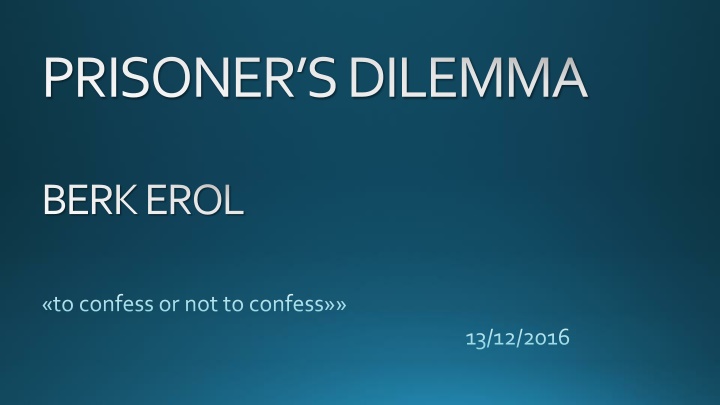
Prisoner's Dilemma in Game Theory and Decision Making
Discover the intricacies of the Prisoner's Dilemma, a key concept in game theory, showcasing the conflict between cooperation and self-interest. Explore the formal presentation and the generalized form of this dilemma, highlighting the challenges of rational decision-making in conflicting situations.
Download Presentation

Please find below an Image/Link to download the presentation.
The content on the website is provided AS IS for your information and personal use only. It may not be sold, licensed, or shared on other websites without obtaining consent from the author. If you encounter any issues during the download, it is possible that the publisher has removed the file from their server.
You are allowed to download the files provided on this website for personal or commercial use, subject to the condition that they are used lawfully. All files are the property of their respective owners.
The content on the website is provided AS IS for your information and personal use only. It may not be sold, licensed, or shared on other websites without obtaining consent from the author.
E N D
Presentation Transcript
PRISONERS DILEMMA BERK EROL to confessor not toconfess 13/12/2016
GAME THEORY The study of mathematical models of conflict and cooperation between intelligent rational decision-makers. Mainly used in economics & business, political science, biology, psychology, philosophy, computer science & logic. Umbrella term for the science of logical decision making in humans, animals, and computers. 1/8
GAME TYPES Cooperative / Non-cooperative A game is cooperative if the players are able to form alliances. Symmetric / Asymmetric In a symmetric game, payoffs depend only on the other strategies not on the players. Zero-sum / Non-zero-sum In zero-sum games, a player benefits only at the equal expense of others. Simultaneous / Sequential In sequential games, players have some prior knowledge about earlier actions. Perfect information / imperfect information A game is one of perfect information if all players know all previous moves of others. Others Combinatorial, infinitely long, discrete/continuous, differential, population, pooling games 2/8
PRISONERS DILEMMA Shows why two completely "rational" individuals might not cooperate, even if it appears that it is in their best interests to do so. Characteristics: non-cooperative, symmetric, non-zero-sum, simultaneous, imperfect information. It was originally framed by Merrill Flood and Melvin Dresher working at RAND in 1950. Albert W. Tucker formalized the game with prison sentences payoffs and named it, "prisoner's dilemma". 3/8
FORMAL PRESENTATION Two members of a criminal gang are arrested and imprisoned. No communication between them (imperfect information). Lack of sufficient evidence. Simultaneously, the prosecutors offer each prisoner a bargain. Each prisoner have 2 opportunities: cooperate or betray Prisoner B cooperates Prisoner B betrays Prisoner A: 3 years Prisoner B: goes free Prisoner A cooperates Each serves 1 year Prisoner A: goes free Prisoner B: 3 years Prisoner A betrays Each serves 2 years 4/8
GENERALIZED FORM R: cooperation reward P: punishment payoff T: temptation payoff S: sucker s payoff T > R > P > S Cooperate Betray Cooperate R, R S, T Betray T, S P, P 5/8
R > P For the overall situation, mutual cooperation is superior to mutual defection. T > R and P > S From an individual perspective, rational outcome is defection. So the dilemma is Mutual cooperation yields a better outcome but it is not rational at the individual level. 6/8
ITERATED PRISONERS DILEMMA The same two players play more than once in succession and they remember previous actions of their opponent and change their strategy accordingly. Requires: 2R > T + S To prevent alternating cooperation and defection giving a greater reward than mutual cooperation. The Evolution of Cooperation (1984) by Robert Axelrod Tournament of the Nstep prisoner s dilemma (with N fixed) for which he invited academic colleagues to devise computer strategies. Winning strategy in Axelrod s tournament: Tit for Tat Cooperate on the first iteration then repeat the opponent s last action. 7/8
NECESSARY CONDITIONS FOR A SUCCESSUL STRATEGY BY AXELROD Nice (optimistic) Not defect before its opponent does. Retaliation Not always cooperation but also sometimes retaliation. Forgiving Fall back to cooperating if the opponent does not continue to defect. Non-envious Not striving to score more than the opponent. 8/8
REFERENCES https://en.wikipedia.org/wiki/Prisoner's_dilemma http://www.policonomics.com/lp-game-theory2-prisoners- dilemma/ http://science.howstuffworks.com/game-theory1.htm https://plato.stanford.edu/entries/prisoner-dilemma/ http://www.investopedia.com/terms/p/prisoners-dilemma.asp http://www.econlib.org/library/Enc/PrisonersDilemma.html http://www.iterated-prisoners-dilemma.net/ http://www.brembs.net/ipd/ipd.html http://serendip.brynmawr.edu/playground/pd.html
